
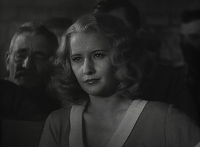 |
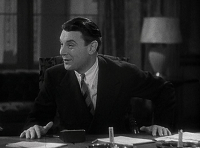 |
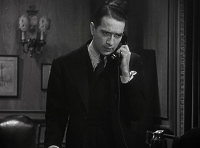 |
| Lily Barbara Stanwyck |
Courtland Trenholm George Brent |
Mr. Stevens Donald Cook |
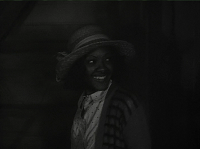 |
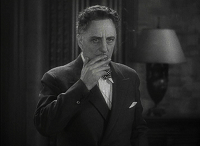 |
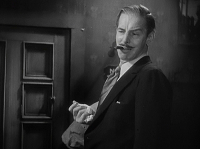 |
| Chico Theresa Harris |
Mr. Carter Henry Kolker |
Mr. Sipple Arthur Hohl |
Proof That It’s Pre-Code
- The film’s main conceit is that all life is exploitation, and you must simply be the one doing the exploiting. One book thumping scholar tells a beautiful young Barbara Stanwyck, “A woman, young beautiful like you has power in the world! […] You must use men, not let them use you. Be the master and make them your slave. […] Exploit yourself! Use men! Be strong! Use men to get the things that you want!”
- Stanwyck plays Lily, who does just such a thing. She handily works her way up the corporate ladder with her appeal and sexual prowess.
- Since the movie is essentially the story of a woman using her sexual prowess and sex appeal to great gains, there’s plenty of scantily clad moments on a few occasions with a few flashes of thigh for good measure.
- And plenty, plenty more. You will not believe how Pre-Code this movie is.
Baby Face: From Rats to Riches
“Have any experience?”
“Plenty.”
Baby Face is an oddity. Perhaps one of the most ‘Pre-Code’ of the Pre-Codes, there are few movies in the history of cinema that have ever been so blunt about indulging in the power of sex.
Barbara Stanwyck is the titular baby face, a girl named Lily who has spent her youth being prostituted out of her father’s illegal speakeasy. Believe it or not, she resents him for this, and has finally gotten to the breaking point when suddenly her father, after attempting to whore her out to a poorly mustached Arthur Hohl, is killed when his illegal distillery explodes.
She stands by the side of the flames and she manages a wry smile.
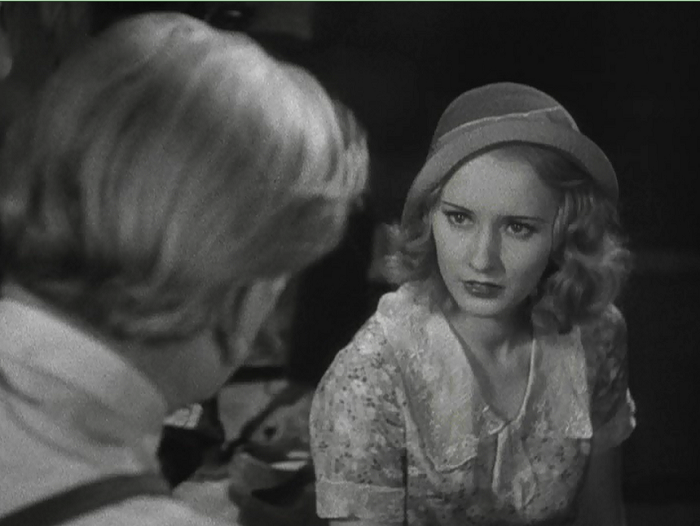
Her future unfolds.
Here’s where things get interesting. She visits a cobbler who’s the only man in town who has ever shown her kindness. He asks her what she’s going to do next, and she responds that she’s been offered money as a stripper. He scoffs at her, and begins to detail his study of Nietzsche that I quoted at the very top of this article.
Power is what she’s got. Why strip for a living when her body could be put to a much higher purpose– and a much higher margin of profit?
So Lily and her colored companion Chico decide to hop a train to New York, and here we get one of the most heavily censored scenes, and for good reason. Since Lily’s total net worth at the moment is in the single digits, they hide in a car filled with hay. When the railroad man comes by to kick them off, Lily stops him and looks him up and down. Chico wanders to the other side of the car, singing a romantic tune with a wicked smile on her face while the railroad man takes off his gloves and Lily pulls him to the corner.
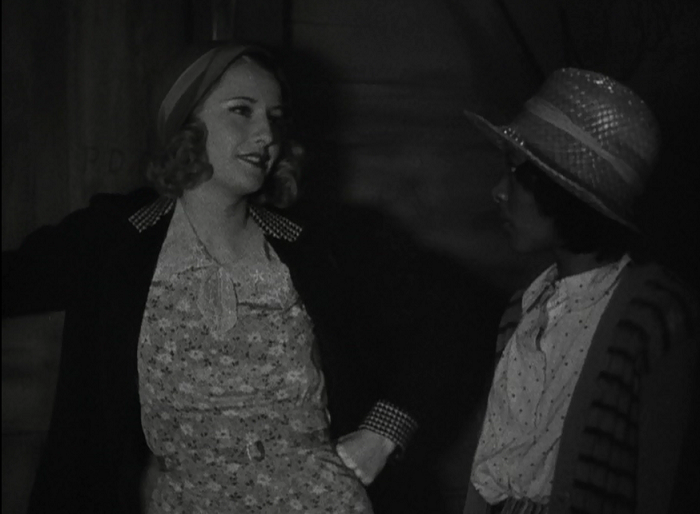
“We’re going to make it after all! … with men!”
This is one of the many times in Baby Face where the implication of sex is as lurid as if we were to witness the actual act. Lily’s ability to be shamelessly open to sexual acts for her own benefit give her a liberated sensibility, and make her short climb up the social ladder both remarkable and gratifying to watch.
Because the movie isn’t just about how Lily will use sex as power, but how men will gladly give away money and possessions hand over fist to experience Lily’s carnal pleasures. She arrives in New York and, upon wandering the streets with Chico, finds a tall phallic building that’s the home of a bank. She decides that she wants to get to the top of it, and makes her way into staffing.
Here she finds a chubby Southern boy very much open to flattery and whatever else she concedes to in his boss’s private office. That’s one way to get a job, and the film readily implies that Lily would have no luck here with talent or skills; in the workplace, the only way for a woman to get higher is to have a strong male advocate working for her side of things.
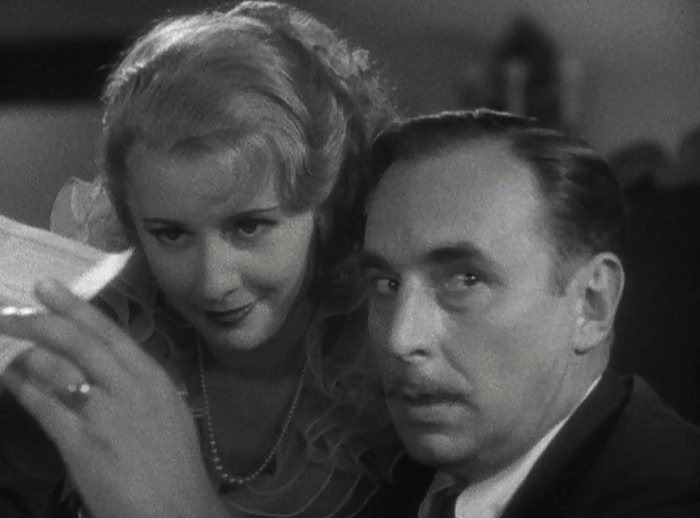
This guy has no idea how deep in it he is.
This may seem horribly regressive, but it’s not like corporations of the 1930’s were teaming with women outside of the secretarial role (with Michael Curtiz’s Female about a only-true-in-the-movies exception). In fact, Lily is noted several times to be a brilliant worker who probably could go high up the ladder if only her gender wasn’t a negative. Thus Baby Face isn’t about using just sex to climb the social ladder, but climbing the social ladder the only way she can.
And climb it she does. The movie infamously implies her sleeping her way to the top by means of cutting to the outside of the building and moving up a few floors every time a new male beau catches her eye. No lateral moves here.
The men she goes through are pleasured thoroughly, and allowed to make themselves thought of as seducers. No one can do the innocent little girl act like Lily, and each man is crushed when she moves onto the next man. She doesn’t use the new men against each other, but simply blows off the former lover. This makes her seduction less of just a physical issue, but a moral one as well; making her men feel like champions of the universe when they’re with her gets what she wants, and if it demoralizes them afterward… well, men are pigs, and they deserve the ill fortune they get.
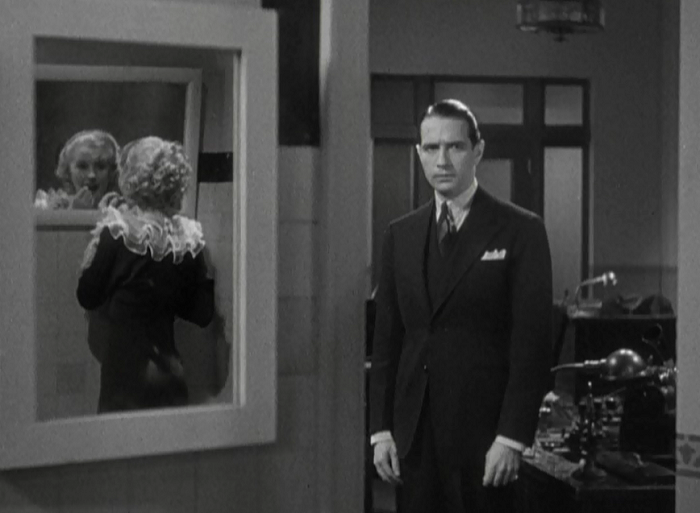
What was she doing that requires a new coat of lipstick? …. Ohhhhhh.
When bad luck intervenes, though, she happily takes advantage. After being caught with a married man in the lady’s bathroom after hours, she plays innocent and moves up again. This time she steals a man away from his nice fiancee, who also happens to be the daughter of Mr. Carter, a Vice President of the bank.
Carter gives Lily a talking too, which results in another innocent routine. Carter not only buys it hook, line, and sinker, but he’s brought on board the boat as Lily’s latest conquest. He gives her a huge apartment filled to the brim with expensive items and Lily now finds herself ensconced in jewels and furs. Chico, who’s stuck around as her faithful servant and only real friend, also gets a lot of furs for someone who’s function remains as a cleaning lady.
Chico’s role in the picture is interesting since she’s someone who comes across as being just as broken by life as Lily. Both grew up in Lily’s father’s speakeasy, though Chico doesn’t appear to have been farmed out for sexual favors. She instead suffer the verbal and mental abuse that dear old dad didn’t have time to muster on Lily, and this makes them akin to sisters. They’re protective each other and what little they can get their hands on, and while Lily is very much the leader, Chico isn’t just a useless simpleton slaving away in the background.
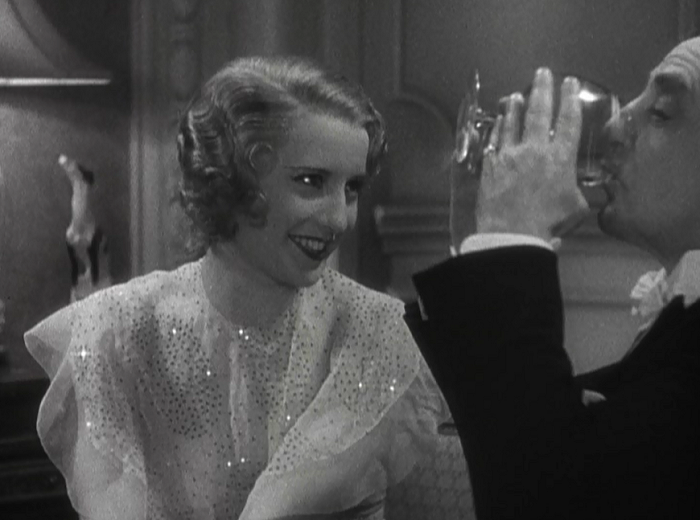
“Keep drinking, sucker.”
There are also signs snuck into the film here that Lily’s arrested development has codified this as the correct course of action for her. Check out the creepy doll collection she keeps on her bed after she hits the jackpot, or her obsession with large gaudy jewels. Thus the movie progresses it isn’t just an act of love that will save the day, but one of maturity developed after heartbreaking torment and pain.
Speaking of, the rest of this review is spoiler laden, so I’ll just say really quick that this film is an essential in every way. Stanwyck, who has been and will remain one of the greatest screen actors our nation has ever mustered, knocks this out of the ballpark, creating a beautiful fragile woman who puts the screws to the world she’s been forced into. This is a great movie, fun and daring, and should be at the very top of everyone’s ‘To Watch’ list who’s interested in the era.
Anyway, spoilers.
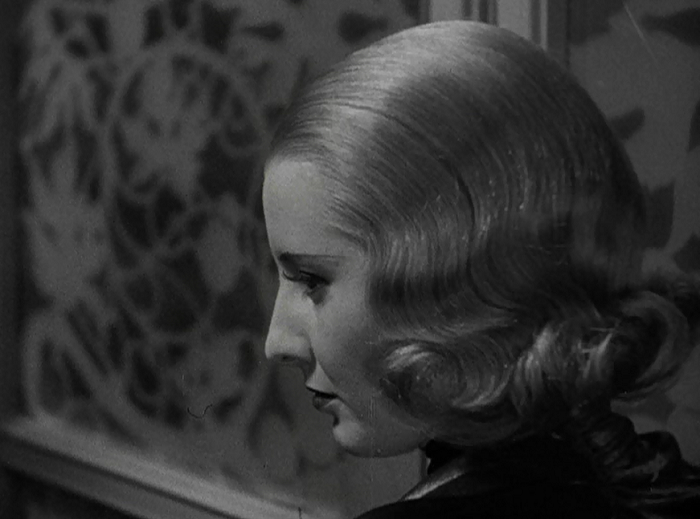
Things can’t always keep going up.
Her latest lover double cross has the unfortunate side effect of a body count. Mr. Stevens gets a gun and shoots Mr. Carter and then himself. Lily is in the apartment at the time, and can only react with detached horror. She calls the police. “There’s been an accident.”
Those words are so telling about what she’s been through and what she will continue to endure. It’s not that she wanted the men dead– she wanted them to pay, certainly– but she never thought her actions could come to something so horrific. And, stunningly, from the look of regret on her face, this brutal act has actually chipped through her emotional facade.
That’s why her next step is to try and get out with as much money as possible, while she can and before anything else terrible can happen that can challenge her lowball view of the world.
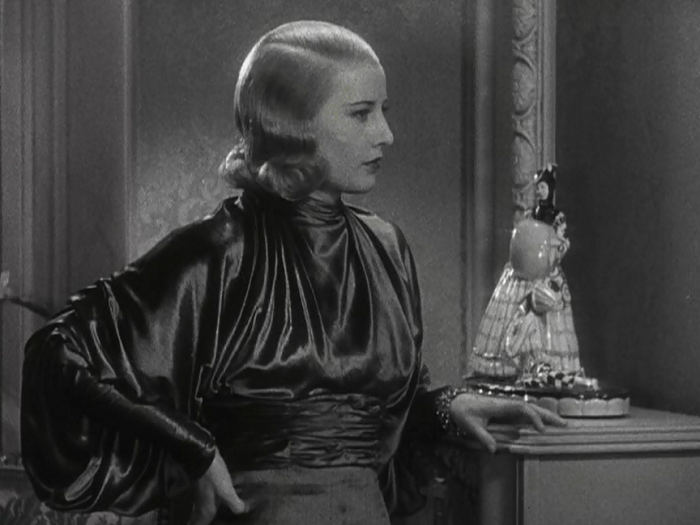
Upon hearing the gunshots, she’s a statue. Will this crack the surface?
That brings me to one aspect of Baby Face that I adore, and that’s that of the 70 minute run time, all but the last twenty minutes are completely lacking even a morsel of romanticism. After the murder/suicide, the heads of the bank decide to buy her off for a handsome sum, and she slyly decides to push her luck and get more money out of them. Unfortunately for her, the bank’s new President, Mr. Trenholm (Brent), catches onto her innocent act and rewards her with a job, instead. In Paris. Feel free to get going whenever you like.
Trenholm is the first and only man in the picture to outsmart Lily, and even then it’s only temporary. He goes to Paris to inspect operations a while later and finds her there. He’s surprised, and more to the point pretty damn turned on that this wicked woman has apparently reformed and settled for a life of hard work at his clever, clever suggestion.
What he doesn’t realize is that this is part of a seduction as well. Lily has gone for the long con now, and waits for him outside in the rain while it pours, ignoring other coworker’s flirtations and offers for umbrellas. She wants Trenholm, and won’t take any substitutions.
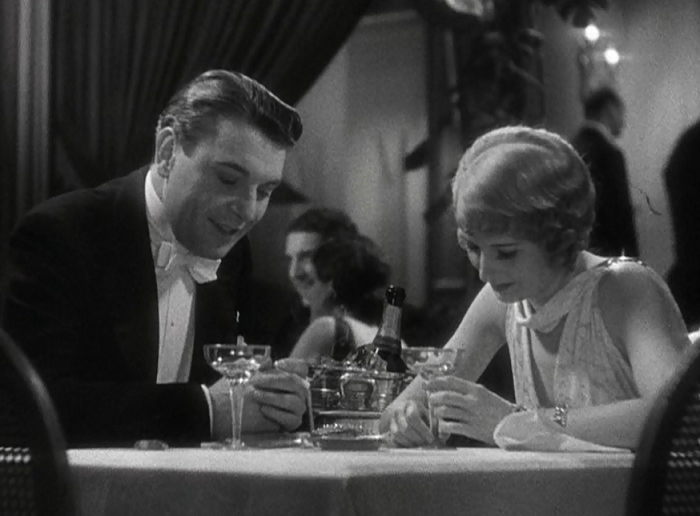
If you want to seduce a man who thinks he has your number, your best bet is to say “No” while handling the stem of your champagne glass in just such a manner.
This leads to one of the film’s funniest and most poignant ironies in that she seduces Trenholm by flattering ego but refusing to give him what he wants; sex. Her final leap to the top requires a wedding ring, and refusing to put out wins it for her.
After the ceremony, this conversation between Lily and Chico sums it all up:
“Know what’s in this case? Half a million dollars. And someday I’ll have the other half.”
“You sure will! You get anything you put your mind on!”
So she’s made it. Unfortunately, a nagging sense of sadness has followed her. Wealth isn’t as satisfying as Nietzsche was supposing it was. Unless he wasn’t just talking about material wealth.
In a world where every man looks her up and down, sizing her up for her sexual pleasure, isn’t it possible that the cobbler’s gift of Nietzsche was also a selfish act? Perhaps he wanted to live vicariously through her. His actions were as selfish as the others, and while Lily benefited from them before, it’s time for her to come to grips with the fact that her affection for her husband may be growing.
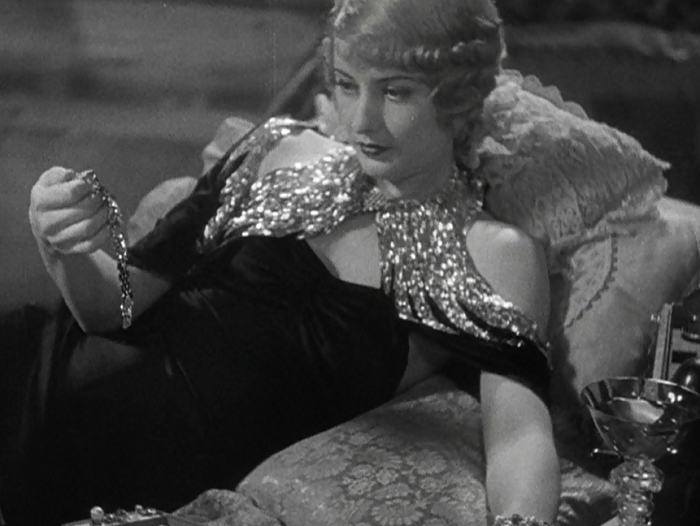
“Made it, Chico! Top of the world!” (Now compare this picture to the one at the very top of this review)
Things eventually work out for the two of them, though Lily has to pick wealth or love and can hardly stand to make the choice she does. The movie ends on a hopeful note, where her steely reserves have been depleted and she can now rekindle her ability to enjoy being alive.
Most of the reviews of the film I’ve read tend to focus on the cuts Baby Face suffered at the hands of censors, and I touch on that a bit below. However, besides being racy as hell, the film also functions as a deft commentary of the times.
The significance that it’s a bank that Lily runs ruin upon probably wasn’t lost upon Depression Era audiences. I’ve read a few people comment that they can’t believe so many men were gullible for Lily’s charms, but at the time the movie was made, a great number of banks had folded and those that survived had all helped contribute to the financial ruin of the nation. Seeing bankers as immoral, power hungry sex maniacs wasn’t much of a stretch.
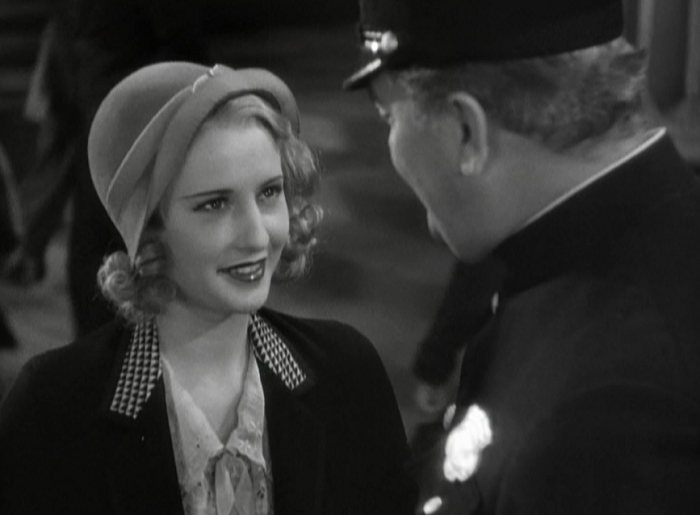
Things will get better.
This also means that Lily’s quest to destroy a bank, and, eventually, work with her husband to reopen and redeem it, is a vicarious one for all audiences. She took advantage of them when they were bad, and she will help make them great again. This time, though, love rather than greed will do it.
Trivia & Links
- A more in-depth discussion of this movie is available in first issue of The Pre-Code Companion. You can also see other available issues and topics covered in the series by clicking here or on the banner below.
- This review is of the pre-Release version of the film included in the Forbidden Hollywood, Volume 1 collection. Because of the content of the film, there are a number of changes that were cut and its message re-framed before its wide release in 1933. Pre-Code guru Mick LaSalle talks about Baby Face as “Pre-Code 101” and dives into the differences. I’m glad I watched the Pre-Release version, and highly recommend it since the altered version dilutes the content considerably.
- The excellent Movie Diva goes into the background of the film, as well as providing a list of what the differences between the Pre-Release and Release version are.
- Another significant change that’s not in the Pre-Release version either, and is a bit of a spoiler: apparently the original end saw Stanwyck’s last minute change of heart punished rather than rewarded. Instead of finding Brent alive after his suicide, he’s dead. I don’t know anything about this ending beyond that, but it does make more sense than someone trying to suicide by shooting themselves in the stomach. (Note: this may not have been filmed this way; I can imagine this is something the Production Code office would have objected to right off the bat)
- Yes, a young John Wayne is in this movie for two or three minutes as another rung that Lily climbed to the top upon. During the Pre-Code era he got some small roles at the majors but spent most of his time in zero budget Westerns.
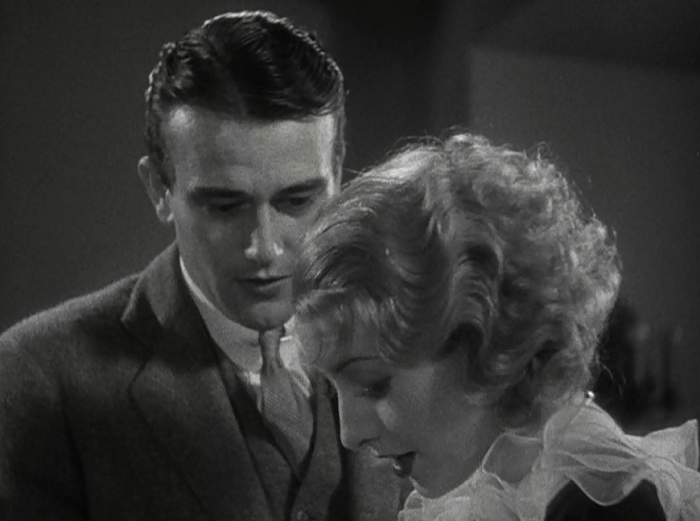
“Well, alright, missy, let’s get to this boot knocking business and then I can get back to the prairie.”
- The oddly named Corndog Chat talks about the films philosophical implications in how it fits into Ethical Egoism: if it benefits you, do it.
- Mordaunt Hall’s original review in the New York Times touches on how the film has raised a scandal at the Hayes Office and led to Daryl Zanuck’s resignation at Warner Brothers (Zanuck also wrote the story for Baby Face). He doesn’t seem very smitten with the picture, though it’s hard to tell since, even though he’s a film critic, he has a difficult time in expressing his opinion.
- According to the IMDB trivia, the boat set in this film was later reused for Three on a Match.
- The movie’s title comes from the old standard “Baby Face”. I’ve posted the lyrics below, and it’s easy to see how the movie connects to the song as it is explicitly about both judging a woman on her looks and admiring her from afar. ‘Afar’ being more specifically ‘heaven’, which is where a few of her suitors coincidentally end up. It’s also a fairly condescending tone, one that wouldn’t be inconsistent with her suitor’s attitudes as well.
Mmm, baby face
You`ve got the cutest little, mmm, baby fa-ace
There`s not another who could, mmm, take your pla-ace
Mmm, baby fa-ace
You start my heart a jumpin`
You sure have started somethin`Mmm, baby face
I`m up in heaven
When I`m in your warm embra-a-ace
I didn`t need a shove, `cause I –
I fell in lo-ove with that cute little
Ah little baby faceMmm, baby fa-ace
You`ve got the sweet little
Mmm – baby fa-ace
There`s not another who could take your place
Mmm, hmm baby face
You start my heart a jumpin`
You sure have started somethin`Mmm, baby fa-ace
I`m up in heaven
When I`m in your warm embra-a-a-a-ace
I didn`t need your help, `cause I –
I fell in lo-ove with a cute little, mmm, baby faceMmm, baby fa-ace
You got the sweetest little, a-baby face
I`m up in heaven with your baby face
Mmm, baby fa-ace
You sure have started somethin`
You start my heart a jumpin`Mmm, baby face
I`m up in heaven
When I`m in your warm embra-a-a-a-ace
I didn`t need a shove, `cause I fell in lo-ove
With your sweet little baby fa-a-a-a-ace
- There’s a couple of rather blah posters for this one, but I did enjoy this one that shows Stanwyck’s evolution from simply reading a book:
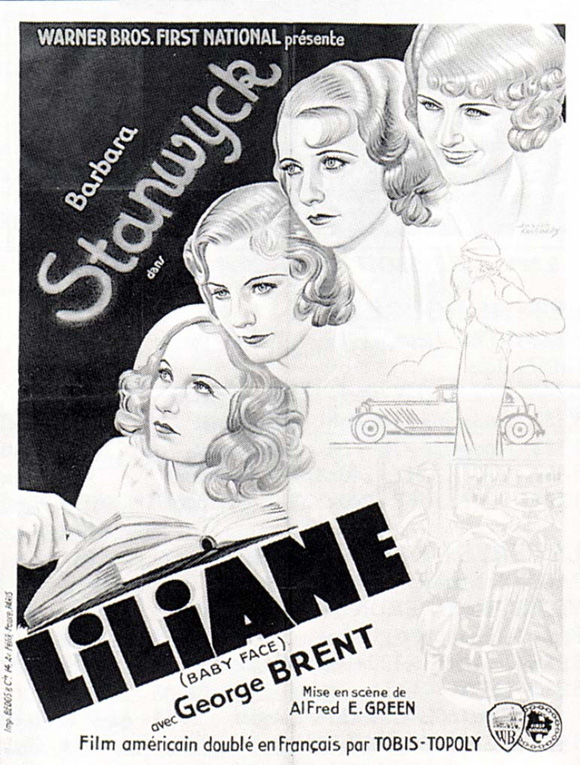
Availability
- This film is available in the first Forbidden Hollywood Collection on Amazon and can be rented from Classicflix.


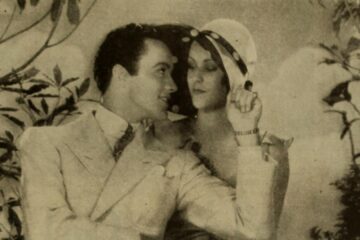


17 Comments
JennyG · October 1, 2013 at 10:32 pm
Excellent review, which captured why I loved almost every second of this film. I just don’t understand why directors paired the transcendent Stanwyck with the very Earth-bound, if not to say charisma-free, George Brent. Also, I might add that Lily’s clothes are beyond beyond and constitute almost another character in the movie. Orry-Kelly deserved an Oscar.
Danny · October 2, 2013 at 8:52 am
Definitely. The transformation that Stanwyck goes through via her clothing for the movie single-handedly demonstrates both her gain in social standing and how cold she’s become on the inside. There’s some great stuff there.
And, yeah, George Brent: I don’t get it.
Edwin Weber · March 25, 2014 at 5:46 am
Roger Dooley in his book”From Scarface to Scarlett” remarks that the character was probably the most totally amoral and cynical woman even in pre-Code movies.
Danny · March 26, 2014 at 2:01 pm
I think that’s a pretty good way to put it, and it’s certainly hard to argue with!
Kelly · June 5, 2014 at 7:59 am
If you want get people interested in pre code films watch this film trust me it that good it is I think Citzen kane of pre code films
Danny · June 7, 2014 at 3:16 pm
It certainly is audacious in any era. Glad you enjoyed it. 🙂
Lisa · February 2, 2015 at 1:59 pm
I just finished watching Vanity Fair for the third time- this movie has some resemblance to Babyface, IMO , does anyone else notice the I guess “same context”?
Danny · February 8, 2015 at 1:25 pm
I actually haven’t seen Vanity Fair– my only experience with it has been the Reese Witherspoon version. I definitely need to check that out now– you’ve piqued my curiosity.
Rich · April 18, 2015 at 10:33 pm
I figured I’d mention, this movie is now available on a TCM DVD set with three other Stanwyck movies, for those of us who are Stanwyck fans first and pre-code fans second. Baby Face is definitely my favorite of her pre-codes, btw.
Marc · June 6, 2015 at 6:47 pm
A real life story reminiscent of Baby Face. Someone in the IMDB message board for this film noticed the similarities: http://www.vanityfair.com/style/2014/03/wendi-deng-note-tony-blair
Danny · June 11, 2015 at 1:55 pm
It’s a fascinating parallel, for sure.
Charles · July 17, 2015 at 3:07 pm
What was the name of the song Chico the maid kept singing throughout the movie.
It was the same musical score played everytime they showed stanwyck move up to another position in the company
Does anyone know
Tommy · July 21, 2015 at 4:30 am
St. Louis Blues from 1914
Red · March 23, 2018 at 2:02 am
“St. Louis Blues” seems to crop up in almost every single pre-Code about a sexually conniving woman. I mean, when you look at the lyrics, it’s not hard to understand why:
“St. Louis woman,
With her diamond rings,
She drags that man around
By her apron strings”
—but the sheer prevalence of it in these flicks boggles my mind. It *is* very catchy, though.
qacm · August 11, 2016 at 4:33 am
A splendid review of a brilliant movie — for my money the single film that best exemplifies the Pre-Code era. But even more than what it stands for, Baby Face stands on its own as a great achievement in movie-making: a bold, daring script, terrific direction, and an unforgettable portrayal of the lead character, with the great Barbara Stanwyck at the peak of her powers. Baby Face is pure, audacious genius on every level.
Lisa A Alkana · May 25, 2018 at 3:02 pm
When I first saw Baby Face years ago only the altered version was available. The restored version is much better, although Stanwyck is strong enough to make even the cut version work. Theresa Harris brings subtle depth to Chico. She had her banner year in 1933 with her roles as friend/co-conspirator in Baby Face and in Professional Sweetheart with Ginger Rogers. Baby Face is the strongest and sexiest pre-code. That said, the pre-code that pre-codes them all may be The Story of Temple Drake. This Miriam Hopkins film is so dark it is very rarely seen, even today.
hal · June 29, 2019 at 4:03 pm
When the railroad man enters the train car and puts his hands on Lilly how precode, a white man touching a black women
Comments are closed.